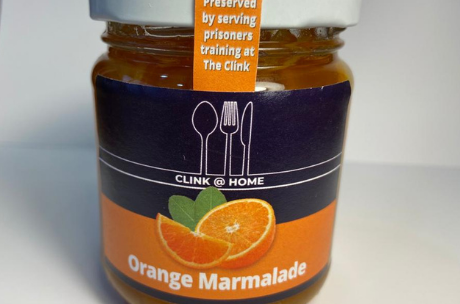Weekly Notes: legal news from ICLR, 22 February 2021
This week’s roundup of legal news and commentary includes captive cuisine, broken rules, lack of transparency, and unregulated lawtech. Plus marmalade.… Continue reading

Prisons
Kitchen training to help cut reoffending
The Clink Kitchens training programme, which has been effective in cutting reoffending by over 30%, is to be extended to up to 70 prisons, the government has announced:
Over the next 3 years, Her Majesty’s Prison and Probation Service (HMPPS) and The Clink charity have agreed to extend their training programme, currently already operating in HMPs High Down, Cardiff, Brixton and Styal, to offenders working in an additional 70 prison kitchens.
Following successful pilots, training will continue at HMPs Bristol and Styal and from the end of April they will be first joined by Eastwood Park, Send and Downview with a steady further rollout creating opportunities to help as many as two thousand offenders into employment and away from crime for good.
The Clink’s training scheme has been shown to significantly cut rates of reoffending, with offenders 32% less likely to go on to commit further crimes, compared to those who did not receive training (ie the likelihood of their reoffending was only 15% as opposed to 22%, according to Justice Data Lab). The training involves serving prisoners working in professionally run kitchens for up to 35 hours a week, preparing and cooking up to 80,000 daily meals for fellow prisoners. Trainees work towards gaining City and Guilds National Vocational Qualifications Levels 1, 2 and 3, while improving their confidence, teamworking and communication skills.
The Clink Charity is unique as it not only delivers training inside the prison but carries on with full support and mentoring post-release to help them reintegrate back into society, gain full-time employment and ultimately reduce reoffending.
The Clink also has an online shop selling, among other things, their own marmalade.

No doubt Paddington would approve.
Legal information
Court rules broken (up)
The Rules of Court (criminal, civil and family) have till now been published on the Justice.gov.uk website which also houses cause lists for the senior courts (see below) and other information relating to the administration of justice and dealing with offenders. But this material is gradually being ported over to that vast warehouse of government information, Gov.uk. There is a notice on Justice.gov.uk saying “This website will be closing soon.” Not everyone is happy about this. Indeed, there have been many complaints.
The main problem is that instead of displaying an entire set of rules, whether relating to criminal, civil or family procedure, on a single page relating to those courts, thus enabling users to search easily across the whole set, the new versions have been broken into chunks. Both the Civil Procedure Rules and the Family Procedure Rules have also been moved and broken into separate chunks of 20 rules. The Criminal Procedure Rules have been broken into myriad downloadable documents, which are even more fragmented.
The move appears to have been a long time coming: Greg Callus posted a link on Twitter to a blog post (on which he’d commented) by a Gov.uk developer dating from 2013, Moving specialist justice info to GOV.UK, which was meant to have been done by 2014. The blog said:
“This will be a big challenge given that the content is generally more complex than information for the general public.
However, we know that professional users are often busy and have to find what they need quickly.
Some of the information will also have to be made more accessible for non-professionals, like those who represent themselves in court or at a tribunal.
With things that can’t be rewritten — as with court procedure rules and instructions for prison officers — we may be able to make it easier for users to search and navigate their way through the content.”
This aim of making things easier for non-lawyers is perfectly admirable, and may explain why the Criminal Procedure Rules have not only been broken into bits, each of which must be downloaded and read in isolation as a Word document, but each bit, or Part, has its own little explanation. Part 4 appears thus:
“Part 4 Service of documents (MS Word Document, 110KB)
This Part contains rules about the ways in which courts and the people involved in a case can send information and documents to each other.”
This may or may not help a struggling litigant in person, trying to defend themselves in court. A professional user may, of course, have access to all the rules via their copy of Blackstone’s Criminal Practice or the venerable Archbold; just as a civil practitioner will have the “White Book” and a family practitioner the “Red Book”. These bibles of court procedure contain all the rules plus a lot of annotation, case references, footnotes to die for, etc. But many professional lawyers were very happy to use the quick and convenient online link to Justice.gov.uk where they could also view the latest amendments and updates. It wasn’t perfect. The amendments often took weeks if not months to be incorporated into the main text. But it was there — all in one place. Finding stuff on Gov.uk is like wandering around a warehouse in the dark, with a manifest written in a foreign language, such is the unpredictability of the search function. And you can’t browse for things like Rules of Court.
See also:
- Transparency Project, Rules are made to be broken…into chunks (pointing out that some of them are even missing!)
- Litigation Futures: Minister promises urgent review of new CPR website
- Law Society Gazette: Justice minister pledges immediate review of new CPR website
Cause lists moved
As noted above, the daily cause lists are also being moved from Justice.gov to Gov.uk. The lists relate to various divisions of the High Court and Court of Appeal sitting in the Royal Courts of Justice in the Strand, plus the High Court in some other locations, such as the Rolls Building and First Avenue House. In many cases, such hearings are currently being conducted remotely, so the lists include details as to how to log in to whatever video conference platform is being used (eg MS Teams).
As with some court rules, the lists for individual courts have to be downloaded as a document. That may or may not make it harder for a third party to scrape the lists and store them, possibly in breach of data protection. That may be something the Judicial Data Protection Panel have considered. We don’t know. However, there has been concern from some lawyers that the separation of powers is not being properly observed in that listing is ultimately a judicial function and should really be published on the Judiciary website (which is not part of the gov.uk domain).
Public procurement
PPE contracts unmasked
The Good Law Project, a crowdfunded campaign group that uses litigation to achieve social and political change, has won a well publicised victory in its attempts to hold the government to account over the public procurement of personal protective equipment (PPE) during the early months of the coronavirus pandemic. The GLP is bringing a number of cases relating to the process by which a large number of highly lucrative contracts were very quickly handed out in something of a desperate panic to provide PPE for the health service and others, after the existing officially managed stockpiles of PPE turned out to be useless or out of date. The whole process was the subject of a very critical report by the National Audit Office last November: see our summary in Weekly Notes, 23 November 2020. Not everyone admires the strident way the GLP publicises its campaigns or crows about its victories, but it can’t be denied that the subject matter of these claims is a matter of considerable public interest.
One of the claims concerned the failure of the government to publish timeously the details of many of the PPE procurement contracts that were awarded. In R (Good Law Project and others) v Secretary of State for Health and Social Care [2021] EWHC 346 (Admin) Mr Justice Chamberlain held that the Secretary of State for Health (Matt Hancock MP) and his department had failed to comply with a policy to publish, within a specific timeframe, details of the PPE contracts awarded during the early part of the pandemic. The defendant eventually admitted a breach of reg. 50 of the Public Contracts Regulations 2015 (“PCR”), which requires publication of a contract award notice (“CAN”) within 30 days if the contract is worth more than a specified minimum. But the court found they were also in breach of an official Transparency Policy and Transparency Principles which required publication of the provisions of any contract with a value over £10,000, and issued a declaration to the effect that this too was unlawful. Other claims, for example that the government had a systematic policy of not publishing, were rejected.
The proceedings were held remotely and live-streamed in the usual way to allow press and public to watch at the time, but the judge rejected an application for them to be pre-recorded by a film production company so that they could be broadcast later. In so ruling, he held himself bound by the current legislation (amendments to the Courts Act 2003 inserted by the Coronavirus Act 2020, relaxing to a limited degree a prohibition originally enacted in section 41 of the Criminal Justice Act 1925) but the decision was seen as overly restrictive and mourned as a missed opportunity to improve transparency and open justice in the courts.
See also:
- Transparency Project, The PPE procurement case: transparency missed in both politics and law
- David Allen Green, Law and Policy Blog, Why a production company was not allowed to pre-record and broadcast the coronavirus procurement case — a guided tour of the court’s reasoning
- Steven Barrett, Spectator: No, Hancock’s PPE contracts haven’t been ruled ‘unlawful’
Law tech
Regulation stations!
The Legal Services Board has undertaken a programme of work on technology and innovation and has consulted technology developers, legal services providers, technology-based legal businesses, and consumers with a view to identifying challenges and questions regarding AI in the legal services sector, and in particular the need for and scope of regulation. In evidence given to the Committee on Standards in Public Life last year and recently published, they said:
“We know that technology is an increasing feature of how legal services are delivered, and that Covid-19 has likely cemented its role in the sector. Our research indicates that unregulated providers tend to be more innovative and bigger uses of technology. This gives rise to questions on whether there is a widening consumer protection gap between users of regulated and unregulated legal services. It also raises questions on whether the current scope of regulation is limiting technological innovation in the sector.”
They say “The role of AI, and other emerging technologies, will be considered as part of our wider policy work.”
The LSB oversees the work of 15 approved regulators of various legal professions and services, and is considering to what extent each of them might need to ensure that their regulatory approaches to technology are “broadly acceptable to both legal services consumers and providers, and compatible with wider public interest”.
In a similar vein, this month the Association of Consumer Support Organisations (ACSO) has published its Technology & Innovation report 2021 suggesting that
“LawTech solutions, particularly those which do not require human involvement, can lead to consumer detriment, and the development and adoption of LawTech must be regulated effectively to safeguard people properly”.
See also: Legal Futures, Time to consider regulating lawtech firms, report says
Other recent publications
Human rights and religion in the UK: a note for the Human Rights in Action project
Cross-post by Frank Cranmer on the Law & Religion UK blog of a piece written for the Human Rights in Action project, which has been launched by Paul Johnson and Silvia Falcetta, of York University’s Sociology Department, with a view to submitting evidence to the Independent Human Rights Act Review. This post provides an assessment of the influence of the Human Rights Act on religious rights and freedoms in the UK, showing how the Act “has had a considerable – and positive – impact on the willingness of the courts to uphold the right to manifest religion in a way that takes due account of the rights of others”.
The government’s hasty Covid law-making cannot become a template for the future
Article in the Guardian by Sir Jonathan Jones QC, the former Treasury solicitor and permanent secretary of the government legal department, on the rule of law implications of the government’s lawmaking and conduct during the coronavirus pandemic, particularly in the extent to which it has bypassed normal parliamentary processes and avoided proper scrutiny.
United States: Media and Law Round Up — January 2021 to February 2021
Useful roundup from Inforrm’s Blog on recent legal developments in the USA, including Trump’s second impeachment trial, the attempts to ban TikTok and the conduct of other social media platforms, eg in banning Trump; and the Julian Assange extradition saga.
Covid-19 coronavirus and global employment law: Managing your workforce throughout the pandemic — can you require employees to have the vaccine before they return to the workplace?
Webinar in which members of Allen & Overy’s Global Employment team discussed the significant issues and challenges that employers need to prioritise in relation to managing and supporting their workforce as we continue to navigate the Covid-19 coronavirus pandemic.
Malpractices of the Senior Bar, 1862
Entertaining tales of the Irish Bar on Ruth Cannon’s blog Stories of the Four Courts. This one concerns the dubious practice of overbriefing, whereby senior counsel would take on more cases than they could simultaneously appear in, but continue to press clients for fees even when they hadn’t actually appeared in their cases.
Book review: The Secret Magistrate
We review the anonymous author’s inside view of the magistracy and conclude that
“If this book enjoys even a tenth of the success and attention that the Secret Barrister’s did, it will make a major contribution to public knowledge and understanding of the magistracy and what magistrates’ courts do.”
And finally…
A (rare) marketing message:

You can now subscribe directly to ICLR.3, our fast and intuitive case law platform, for access to The Law Reports, WLR and other series published in our office capacity as the Incorporated Council of Law Reporting for England and Wales. Individual users can sign up online on a monthly basis, able to cancel any time; or by paying annually at a cheaper overall rate, from as little as £75 a month. (Multi-user subscriptions, eg for chambers, law firms or academic institutions, should be negotiated with our sales team.) All the details are on our new Pricing page.
Subscriptions provide access to the premium content: you can still use the search and case citator facilities, search for legislation and read our daily case summaries and unreported judgments, all without logging in. And for bloggers, it’s very easy to link to cases (including those published on BAILII) which we have indexed in our citator.
That’s it for this week. Thanks for reading, and thanks for all your tweets and links. Take care now.
This post was written by Paul Magrath, Head of Product Development and Online Content. It does not necessarily represent the opinions of ICLR as an organisation.
Featured image: prison kitchen scene from Paddington 2 (2017) via IMDb